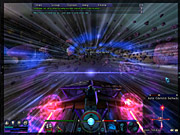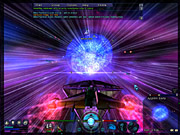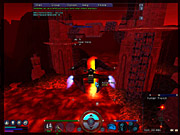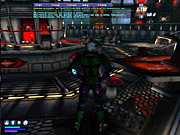Earth & Beyond takes the standard high-fantasy formula of online role-playing games and replaces the castles and swords with space stations and beam weapons. It isn't the first online role-playing game to relocate to outer space (it was preceded by NetDevil's Jumpgate), but it is the first to do so without employing elements of space combat simulations. Earth & Beyond takes the primary mechanics of games like EverQuest and Dark Age of Camelot and transports them--with some minor but welcome changes--to space. And while the setting is the game's most unique feature, it's also the source of its problems. Some elements of the traditional online RPG just don't translate well to the environment, and the most notable sacrifice is the sense of community among players. In space, it seems, no one can hear you /yell.

The first few hours of Earth & Beyond are the most enjoyable. The opening tutorial introduces you to the interface and gives you a few simple missions to carry out so you can learn the primary skills of your chosen class. There are six classes available, each of which puts varying emphases on the combat, exploration, and trading specialties. Three of the classes are primarily fighters. There's the terran enforcer, the jenquai defender, and the progen warrior. Terran tradesmen are primarily traders and craftsmen, though at this stage in the game, they can be powerful fighters as well. Jenquai explorers are the weakest fighters but have access to faster ship components. The final class, the progen sentinel, is a hybrid of a warrior and explorer.
One of the most interesting mechanical differences between Earth & Beyond and your typical online RPG is the fact that experience can be gained in three different areas. You gain trade, exploration, and combat experience independently, and you can access some of your class skills only when you reach a certain level in a particular area. These three areas combined give you your overall level, which also determines what sort of skills and components you can access.
It's a good system, and one that encourages you to experience everything the game has to offer. With each new level, you gain skill points, and these can be distributed to improve your skills. You will rise in level very quickly, but saving your skill points is a good idea. Later skills require more points to access, so if you spend your points haphazardly early on in your character's career, you'll find that your character may be well rounded, but not very strong in a needed area.
Earth & Beyond is all about your character's talents. This game is not Wing Commander, and its combat doesn't involve any simulation elements. Instead, fights are entirely dependent on your character's abilities. You target an enemy, activate your guns, and hope you win. It's no more a space combat simulation than Dark Age of Camelot is a sword-fighting simulation. Each class has several unique skills that are useful during or directly following combat. For example, warriors can use their shields as offensive beam weapons, explorers can fold space for a quick getaway, and sentinels can jump-start ships that are dead in the vacuum.
Character death is handled in an interesting way in Earth & Beyond. There is no traditional experience penalty. That is, you don't lose acquired experience after being defeated. Instead, you lose future experience. The "experience debt system," as it's called, takes 50 percent of any experience you earn after dying and puts it toward paying back the debt. Once the debt is repaid, you earn experience normally.

Earth & Beyond's combat is both safer and more interesting in groups, and joining with others gives you significant bonuses. These bonuses depend on which classes the members of your group belong to. For instance, tradesmen will increase the amount of money you receive when selling items, defenders make it more likely that you'll land a critical hit, and warriors reduce the amount of hull damage you'll sustain from enemy attacks. The bonuses don't make much sense, but they are great incentives to seek out companions.
Unfortunately, getting an edge on your enemies in a fight is one of the only incentives to seek out other players. Earth & Beyond may be the first online RPG in which you can play solo for as long as you care to. Unless you join a guild (of which there are many, and they seem to be constantly recruiting), you won't encounter many other people while playing Earth & Beyond. There are several reasons for this. For one, the space stations--which allow you to leave your ship and walk around--are either completely deserted or so crowded that the lag is unbearable. The chat window is unreadable at most reasonable resolutions. Most everyone just hangs out in the chat room for new players, arguing about how the last update patch has ruined their character class, or discussing various topics that don't really relate to the game. You can find help and answers to your questions, but only if you're doggedly persistent.
And you don't actually fly around much in Earth & Beyond. Instead, you plot a course on a navigational map and warp to your location. As a result, most players you see will be warping past you, and there's no real sense of discovering a group taking on a huge beast, or a low-level novice running for his life. There's just players warping to and fro, delivering goods or seeking out monsters to fight.

This "strangers warping in the night" problem isn't prevalent on planet surfaces. Warping isn't allowed in these locations, so you'll encounter other players more frequently when flying closer to solid ground. But even here, flying takes no skill on your part. There's no collision detection whatsoever, so you can fly through nearly any solid object that isn't part of the landscape. The no-warping restriction just makes traveling in these areas more dangerous and time-consuming.
And Earth & Beyond doesn't need to be more time-consuming. Running trade routes can be immensely repetitive, as you deliver goods from one locale to another, over and over, with very little excitement, since warping makes you all but invulnerable during your travels. This problem is alleviated somewhat once you can afford more-expensive, higher-end engines for your ship, but it's never a good sign when you're considering taking on a certain mission and another player advises you to "bring a book." Mining minerals from asteroids and gas clouds also gets repetitive quickly, but at least there's a sense of danger as you wander into more-dangerous space and drop out of warp to check out the local asteroid fields. These problems all plagued Jumpgate, but they were offset by that game's sense of community, as players worked together to complete huge goals for their faction.
In Earth & Beyond, one of the benefits of having other players around is that player-made goods are superior to those provided by the computer-controlled merchants. There are several elements involved in manufacturing goods. You first must analyze a component, which can often take several attempts (and several destroyed originals) to succeed. You then must get the required ingredients, either by purchasing them or building them. Once you have the needed elements, you can construct an item. Each class can build a few different types of items, but tradesmen can build the most types, and their work is usually the best. Once you get the hang of manufacturing, you can earn a decent amount of cash and some trade experience, so long as you can find someone to buy your wares.
Earth & Beyond also offers other ways to earn money. You can take jobs from kiosks, which were obviously inspired by the mission dispensers in Anarchy Online. You can't take many jobs, though. Once you accept a mission, you'll have to wait 15 minutes until you can take another, but seeing as how most low-level jobs will take you less time than this to complete, the job kiosk isn't a very good choice for those looking to make a quick fortune.

In fact, you'll most likely earn the bulk of your experience, at least in the early hours, by exploring. Earth & Beyond is a really good-looking game, and it's really something the first time you see Saturn and its rings or Jupiter and its moons. Dropping down to a planet surface is equally enjoyable, and each planet surface looks unique enough to keep you searching out new areas. The ships and characters look great as well, and the amount of customization the game allows for is impressive. In contrast, the game's sound is adequate and certainly suitable for the game's futuristic setting, but it's pretty unremarkable otherwise. Aside from the female character who asks for your login information each time you play, the only real sound that will accompany your long and sometimes lonely journeys through space will be ambient new age music and occasional warping and weapon-firing sound effects, which are appropriate enough.
But while the novelty of exploration remains strong during extended play, the combat and trading can both become repetitive. Though some of the creatures you'll encounter look very impressive, there's just not really a sense of danger unless you're unlucky enough to be caught surrounded by much more powerful foes and without any energy to warp to safety. And continually mining and hauling goods back to space stations is exactly as fun as it sounds.
Because massively multiplayer online RPGs are continually evolving, Westwood will hopefully find some means of making the game's trade and combat elements more interesting in the coming months. And to its credit, the game does offer some interesting features that are new to online RPGs, most notably the ability to gain experience and levels without ever fighting a single enemy. In its current state, Earth & Beyond is fun for a short while, and at least you'll have some great sightseeing ahead of you before the game starts to lose its interest.